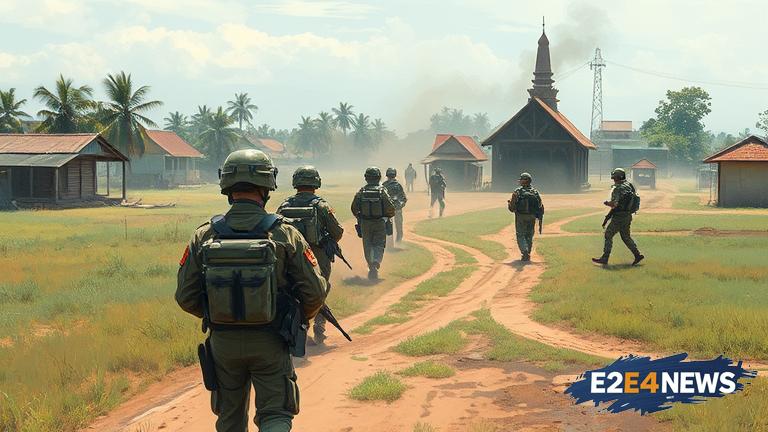The situation along the Thai-Cambodian border has taken a turn for the worse, with increased shelling causing widespread evacuations in the province of Buri Ram. The conflict, which has been ongoing for several years, has now begun to affect areas farther from the border, with shells landing in populated areas, including hospitals, schools, and communities. As a result, authorities have been forced to evacuate these areas, with thousands of people being relocated to safer zones. The evacuations have been carried out in a bid to prevent civilian casualties and minimize the risk of injury or death. The shelling has been attributed to clashes between Thai and Cambodian troops, with both sides accusing each other of aggression. The conflict has its roots in a long-standing dispute over territory, with both countries claiming ownership of a disputed area near the ancient Preah Vihear temple. The temple, a UNESCO World Heritage Site, has been at the center of the conflict, with both sides seeking to assert their claim to the area. Despite numerous attempts at diplomacy, the conflict has continued to escalate, with both sides engaging in sporadic clashes and exchanges of artillery fire. The latest escalation has prompted concerns about the safety of civilians in the area, with many being forced to flee their homes and seek shelter elsewhere. The Thai government has assured citizens that it is doing everything in its power to protect them and prevent the conflict from spreading. However, the situation remains volatile, with the potential for further escalation always present. The international community has called for calm and restraint, urging both sides to engage in dialogue and find a peaceful resolution to the conflict. The conflict has also had an impact on the local economy, with trade and tourism being affected by the ongoing tensions. Many businesses have been forced to close, and tourists have been advised to avoid the area, leading to a significant decline in revenue. The humanitarian situation is also a concern, with many people in need of assistance, including food, shelter, and medical care. The Thai government has pledged to provide support to those affected, but the situation remains challenging. The conflict has also raised questions about the role of the international community in resolving the dispute, with some calling for greater involvement from organizations such as the Association of Southeast Asian Nations (ASEAN). The situation is being closely monitored by regional and international leaders, who are urging both sides to find a peaceful solution. In the meantime, the people of Buri Ram and surrounding areas remain on high alert, waiting for the situation to be resolved. The Thai military has assured citizens that it is doing everything in its power to protect them, but the situation remains uncertain. As the conflict continues to unfold, one thing is clear: a peaceful resolution is needed to prevent further suffering and instability in the region. The international community must continue to urge both sides to engage in dialogue and find a solution that benefits all parties involved. The people of Thailand and Cambodia deserve peace and stability, and it is the responsibility of their leaders to ensure that this is achieved. The situation in Buri Ram is a reminder that conflict can have far-reaching consequences, affecting not just those directly involved, but also innocent civilians and the broader community. It is imperative that a peaceful solution is found, and found quickly, to prevent further escalation and suffering.
